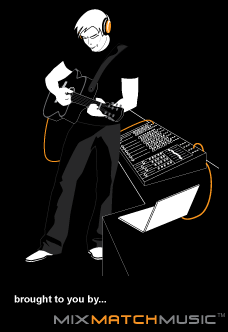For a taste of October’s music, click here.
November’s update comes with over 100 tracks spanning both new and old albums, and quite a bit in terms of the Yancey family. We’ve got hip-hop and indie rock, R&B and rap. Enjoy!
Black Milk, Tronic: An album that pushes the traditional boundaries of hip-hop with futuristic synths and musical approaches, Black Milk still puts out several songs that utilize nostalgic samples. I won’t say much more because I’ve already written a full album review, but in my recent interview with Hieroglyphics members Opio and Tajai, they named Black Milk as one of the hip-hop producers they were liking the sound of recently. Read the full album review here. Don’t Sleep On: “Long Story Short,” “Bounce,” and “Losing Out” featuring Royce da 5’9″
Bloc Party, Intimacy: When Bloc Party released their initial effort, Silent Alarm in 2005, it brought a distinct sound to the indie rock arena with Kele Okereke’s emotional British accent and their hard charging guitars on songs like “Banquet.” That album spawned a remix album before the release of what I viewed to be a lackluster sophomore effort on 2007’s A Weekend in the City, an album that had three, maybe four really solid songs, tops. Thankfully though, Intimacy not only serves to take some of the band’s music in another direction, but returns the indie sound on their rock songs to the top-notch form that looked possible from their debut. Intimacy still has driving drums and screaming guitars, but the band has started to utilize more in the way of drum machines and electronic flourishes that create a new dimension for them to explore and in some cases creates some of the most musically advanced songs the band has produced to date. Okereke’s use of his voice is showing maturity, commanding more range of both pitch and emotion here. In some songs, it feels like the input they had on their work from Silent Alarm Remixes has prompted them to explore in new directions. A very solid album. Don’t Sleep On: “Signs,” “One Month Off,” and “Talons.”
Illa J, Yancey Boys: I’ve read a few reviews of this album that basically mock Illa J’s approach and state that he only made this album because he got posthumously released tracks from his big brother J Dilla. I think these reviews miss the point of the album in that Illa J doesn’t fancy himself a rapper or hip-hopper, he’s a self-described singer/songwriter, so it only makes sense that what he does over Dilla beats is going to be different from Dilla’s output when he was alive. On this album, the younger Yancey proves himself musically diverse and extremely relaxed, while also recognizing the importance of respecting Dilla’s production. The tracks here are laid back and jazzy, and Illa takes no effort to listen to, he’s that easy. Click here for the full album review, and click here for my interview with Illa J. Don’t Sleep On: “R U Listenin’?” feat. Guity Simpson, “We Here,” and “DTFT” feat. Affion Crockett
J Dilla, Welcome 2 Detroit: With the way underground hip-hop is structured and feeds into the mainstream, it’s often possible for fans to miss an initial classic album from an artist, and then never check it out once they’ve gotten big because it gets lost in the new music. With Illa J’s debut album dropping this month featuring almost exclusive production from Dilla, it only made sense to make sure people were aware of J Dilla’s initial solo offering and the way it intersects with the rest of the hip-hop genre. On Welcome 2 Detroit, Dilla’s signature melodic and stoned out beats are in fine form with lyrical help from other Detroit rappers such as eLZhi (WIH6) and Phat Kat. The album, released in 2001, still sounds fresh and innovative today and features several tracks that showcase Dilla’s ability to fuse other sounds into his hip-hop such as the co-produced (Karriem Riggins) “Rico Suave Bossa Nova” and “B.B.E. (Big Booty Express)” which Dilla seems to have created in order to slip onto future releases of the 1977 Kraftwerk album Trans-Europe Express. Don’t Sleep On: “Shake It Down,” “It’s Like That,” feat. Hodge Podge and Lacks, and “Pause” feat. Frank-N-Dank.
Jedi Mind Tricks, A History of Violence: Underground hip-hop mainstays Jedi Mind Tricks return for their 6th studio album with more hard hitting tracks, masterful production and intricate lyrics. The conspiracy themes from previous albums remain here, and the production draws from interesting samples such as the strings and haunting foreign lyrics on “Monolith” and the sparse flute in “Trail of Lies.” The lyrical deliveries on these tracks are tight, concise and deep in content, and on the whole, the album is a display of exceptional craft from artists working together with a common musical vision and knowledge of their strengths. Don’t Sleep On: “Trail of Lies,” “Death Messiah,” and “Heavy Artillery.”
Kanye West, 808s and Heartbreaks: Following the death of his mother, I was wondering what the latest output from an artist so in touch with his emotions and personal experiences would sound like. On the one hand, I could see West shaking off the events of the last year or so and putting out his most bouncy and sample-laden disc to date. On the opposite end of that, I could imagine West delving deep into what was going on and producing an intensely personal album. On 808s, West moves in a direction completely opposite of the roads he’s traveled before, and comes out all the better for it. Let’s be clear. 808s is not an album for anyone expecting the continuation of sound and work from West’s previous three albums, and it’s not an album that everyone is going to enjoy musically. Using an 808 drum machine and extensively using Auto-Tune to sing rather than rap, West has produced a stripped down and emotionally raw album. Heavy on synths and in points retro-80s sounds (tracks here could have made an Aphex Twin or Tricky album), West lays bare what’s going on with him and refuses to apologize for the new direction of his music. What’s amazing is that while I think the roster of musicians today who could completely change course from one album to the next and do so successfully is small, Kanye does make that list with this album. Dark, personal and musically adventurous, 808s and Heartbreaks exposes West as the musician he is rather than the hip-pop clone machine he’s often typecast as. Don’t Sleep On: “Paranoid,” feat. Mr. Hudson, ” “Bad News” (which features a sample from Nina Simone‘s “See Line Woman”) and “Street Lights.”
Ludacris, Theater of the Mind: While some artists are out to create philosophically moving pieces, or to in some way further the hip-hop culture, Ludacris doesn’t concern himself with such lofty ideals. He’s about making money. A lot of it. On his 6th studio album, Ludacris returns with the formula that has made him the hottest rapper in the South’s history… pulsing and grimy beats full of horns and deep bass kicks meet with quick delivery lyrics touching on sex, violence, money and his ability to outsell other rappers. Keep in mind, I’m not saying that this formula doesn’t work for him and doesn’t have its place within rap and hip-hop, but it is without any sort of creative growth that Luda moves forward. If there’s any doubt about the kind of sales Ludacris would like to see, this album is the most saturated rap album I’ve seen in years in terms of cameo appearances. Ludacris is the lone rapper on only 2 of the 15 tracks, getting guest appearances from Floyd Mayweather (yes, the boxer), Chris Rock (yes, that comedian), Jamie Foxx (still an actor?), Common and Spike Lee (one of them is a rapper, right?), Nas, Jay-Z and current Top 40 mainstays T.I., The Game, T-Pain and Lil Wayne. This approach either means that he intends to make a lot of money based on name recognition of his guests or he realizes that to put out an album that only has him on it, he’d need to come up with full lyrics to all of his songs, a task that might seem daunting (I mean, how many times can you really come up with new raps about rims and Cadillacs?) While musically and lyrically this album isn’t challenging, it has certainly produced some tracks that we’re sure to be hearing in clubs and parties very soon. Don’t Sleep On: “Intro” (only a minute of rapping, but well worth it, and one of only 2 songs with just Luda on it), “Undisputed” feat. Floyd Mayweather, and “Wish You Would” feat. T.I.
Opio, Vuture’s Wisdom, Vol. 1: The first in a trilogy of albums to be released by Opio from Hieroglyphics with production by Architect. The idea behind the albums is that people are saying hip-hop is dead, or at least that’s the popular expression lately. Vulture’s Wisdom refers to the ability to pick what’s left of life from the bones of the deceased, and this album shows that Opio hasn’t lost any of the edge that has carried him through more than a decade in the industry as a part of the Hiero Imperium. Be on the lookout for my interview with Opio and Tajai, where they discuss their plans to release a new single every week in 2009. Don’t Sleep On: “Don Julio,” “Mind, Body and Soul,” and “Some Superfly Shit.”
Singles… these are the songs where the full album just didn’t cut it, but the songs deserve their time in your ears. Check out “4 Wind,” a multi-lingual remix of the cut from Breez Evahflowin and Dirt E. Dutch’s Troublemakers album, and the radio ready hip-pop of T-Pain songs “Can’t Believe It” featuring L’il Wayne and “Karaoke” featuring DJ Khaled where T-Pain goes off on the rest of the industry (funny coming from the guy who did “Bartender”) and claims the only cool rappers are Kanye West and L’il Wayne. Well, at least he’s consistent. There you have it, the November update… up next is the second installment of last year’s 11 Songs to Be Thankful For.





